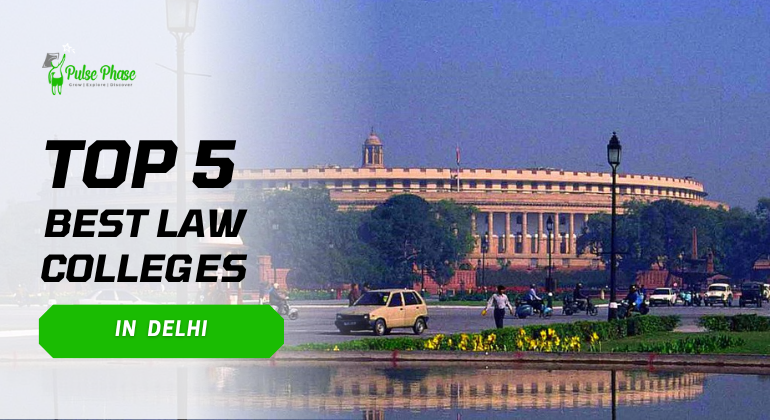Delhi is central to the story of India. It is a location of immense political importance and is also home to numerous academic institutions. Many students planning to build a life in law—be it working for a corporation, public service, or as para para-librarian—will find that Delhi has some of the top-ranked law colleges in the nation.
This article explores the top five law colleges in Delhi, evaluating various aspects including infrastructure, academics, job prospects, and student experience.
1. National Law University, Delhi (NLU)
Founded: 2008
Type: National Law University
Programs offered: B.A. LL.B. (Hons.), LL.M., Ph.D.
Admission Through: AILET (All India Law Entrance Test)
Why It’s a Top Choice:
NLU Delhi has the distinction of being one of the top three law schools in India. It’s a 5-year integrated B.A. The LL.B. program that is available through the AILET test is well noted for the extensive academic coursework as well as the strong emphasis on research. The school incorporates academic research into the course structure through mooting, legal aid, internships, and journals, which is of great advantage to students.
Career Opportunities:
Students of NLU Delhi have been enjoying a high level of placements over the years, to the extent that international as well as national law firms only seek to recruit students from the school. Other areas that students are said to dominate are judicial clerking, civil services, and education, which include such institutions as Oxford, Cambridge, and Harvard.
2. Faculty of Law, University of Delhi
Established: 1924
Type: Central Public University
Programs Offered: 3-year LL.B., LL.M., Ph.D.
Admission Through: CUET-PG (for LL.B. and LL.M.)
Legacy of Legal Excellence:
One of the oldest law faculties in India, DU’s Faculty of Law has produced many of the country’s top legal professionals. The university operates through three centers: Campus Law Centre (CLC), Law Centre-I, and Law Centre-II. It focuses on the 3-year LL.B. program for graduates from various academic backgrounds.
Key Strengths:
Located near the Supreme Court and Delhi High Court, students gain hands-on legal experience and opportunities for internships with senior advocates and judges. With a modest fee structure and rigorous curriculum, it’s a top destination for serious legal aspirants.
Placement Snapshot:
Many DU Law graduates go on to become judges, lawyers, professors, and civil servants. The network and reputation of DU Law open doors to litigation and government jobs alike.
3. Amity Law School, Noida (Affiliated to GGSIPU)
Established: 1999
Type: Private Institute (Affiliated to GGSIPU)
Programs Offered: B.A. LL.B. (Hons.), BBA LL.B., LL.M.
Admission Through: CLAT/Amity Law Entrance
Modern Learning Environment:
Amity Law School is recognized for its global outlook and industry-centric approach. With ultra-modern infrastructure, digital learning tools, and frequent legal workshops, the school focuses on producing practice-ready professionals. Amity emphasizes holistic development with regular moots, debates, and international exposure.
Career Growth & Placements:
The placement cell facilitates job offers in corporate law firms, LPOs, and multinational companies. Alumni also pursue advanced legal education abroad or prepare for judicial exams. Though private, the institute offers scholarships and student exchange opportunities that make it competitive with public institutions.
4. Indian Law Institute (ILI), New Delhi
Established: 1956
Type: Deemed University
Programs Offered: LL.M., Ph.D., PG Diplomas
Admission Through: ILI Entrance Exam
Specializing in Research & Postgraduate Studies:
While ILI does not offer undergraduate law programs, it is a hub for postgraduate legal education and research. Located close to the Supreme Court, it attracts law graduates and professionals seeking specialization in areas like Human Rights, Cyber Law, and IPR.
Academic and Professional Edge:
ILI’s academic environment is enriched by legal experts, former judges, and senior academicians. It publishes the renowned Journal of Indian Law Institute and regularly organizes legal research seminars and workshops.
Who Should Apply:
Ideal for those pursuing a career in legal research, academia, or policy-making. Many ILI alumni work in judicial services, research organizations, and international law agencies.
5. Jamia Millia Islamia – Faculty of Law
Established: 1989 (Law Faculty)
Type: Central University
Programs Offered: B.A. LL.B. (Hons.), LL.M., Ph.D.
Admission Through: JMI Entrance Exam
Legal Education with a Social Focus:
Jamia’s Faculty of Law has grown rapidly in reputation due to its focus on public law, social justice, and inclusive education. The university offers a five-year integrated B.A. LL.B. program with a curriculum aligned with modern legal challenges and ethics.
Learning & Development:
Students benefit from legal aid camps, mock trials, public policy discussions, and internships. The law faculty is known for its approachable faculty, cultural diversity, and a balance of theoretical and applied learning.
Career Outcomes:
Jamia law graduates are known for their contribution to litigation, human rights law, and government services. The faculty’s growing industry reputation and commitment to value-based education give it a unique edge.
Comparison Table of Top Law Colleges in Delhi
| College Name | Key Program Type | Entry Exam | Unique Features | Placement Range |
| NLU Delhi | 5-year Integrated | AILET | National Law Status, Top-tier Placements | ₹15–18 LPA |
| DU Faculty of Law | 3-year LL.B. | CUET-PG | Affordable, Top Alumni Base | ₹6–10 LPA |
| Amity Law School, Noida | 5-year Integrated | CLAT/Amity Test | Global Exposure, Private Facilities | ₹4–6 LPA |
| Indian Law Institute | LL.M., Diplomas | ILI Entrance | Research Focus, Located near SC | ₹6–8 LPA (LL.M.) |
| Jamia Millia Islamia Law | 5-year Integrated | JMI Entrance | Socially Inclusive, Holistic Curriculum | ₹5–7 LPA |
Conclusion: Choosing the Right Law College in Delhi
Choosing a law college isn’t just about rankings; it’s about aligning the institution’s strengths with your career vision.
- If you’re aiming for high-end law firm placements or international careers, NLU Delhi is your best choice.
- Graduates looking for a robust 3-year LL.B. program with real courtroom exposure should consider DU Faculty of Law.
- Amity Law School is well-suited for students seeking a structured, private law school experience with a corporate orientation.
- For advanced legal education and research, ILI is unmatched.
- Jamia’s Faculty of Law is ideal for students who value social justice, academic rigor, and diversity.
Every law college in this list offers something unique. The right pick depends on your interests, long-term goals, and preferred learning style.
Frequently Asked Questions (FAQs)
Q1. Which law college in Delhi is the best for a 5-year integrated program?
A: NLU Delhi is the most reputed law college in Delhi for a 5-year B.A. LL.B. (Hons) program.
Q2. What is the most affordable law college in Delhi?
A: DU Faculty of Law and Jamia Millia Islamia are among the most affordable with excellent academic value.
Q3. Is private law education in Delhi worth it?
A: Yes, institutes like Amity Law School provide quality education, exposure, and placements comparable to public universities.
Q4. Which law college is best for an LL.M. in Delhi?
A: Indian Law Institute (ILI) is the top choice for postgraduate law studies and legal research.
Q5. Are placements good in government law colleges in Delhi?
A: Absolutely. Both DU and NLU Delhi have consistently excellent placement records with law firms, the judiciary, and the civil services.
READ MORE ABOUT:
1. TOP 5 BEST LAW COLLEGES IN AHMEDABAD
2. CLAT 2025 PREPARATION LIST: A COMPREHENSIVE GUIDE TO NLU CHOICES AND RANKINGS

